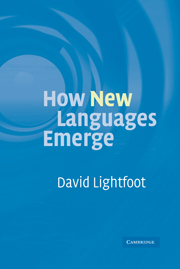Book contents
- Frontmatter
- Contents
- Preface
- 1 Internal languages and the outside world
- 2 Traditional language change
- 3 Some properties of language organs
- 4 Languages emerging in children
- 5 New E-language cuing new I-languages
- 6 The use and variation of grammars
- 7 The eruption of new grammars
- 8 A new historical linguistics
- References
- Index
4 - Languages emerging in children
Published online by Cambridge University Press: 02 February 2010
- Frontmatter
- Contents
- Preface
- 1 Internal languages and the outside world
- 2 Traditional language change
- 3 Some properties of language organs
- 4 Languages emerging in children
- 5 New E-language cuing new I-languages
- 6 The use and variation of grammars
- 7 The eruption of new grammars
- 8 A new historical linguistics
- References
- Index
Summary
E-language perspectives
The central claim of this book is that if we view the human language capacity in terms of an I-language system, focusing on internal, individual properties, we will take different approaches to the study of language acquisition and therefore to the study of historical change. That, in turn, will enable us to understand how new languages may develop. Now that we have begun to explore I-language ideas, let's see how they might impinge on ideas about language acquisition and learnability. We shall adopt an approach quite different from what one finds in most of the generative literature.
Acquisition involves the study of children and learnability represents its theoretical and computational aspect: learnability models portray how a natural language organ might emerge in a child under naturalistic boundary conditions. So far, I shall argue in this section, work on learnability has been dominated too much by E-language approaches. If children acquire I-languages with the properties discussed in the last chapter, one would expect acquisition to reflect their I-language nature. A simple example: if children acquire the kind of abstract systems just discussed, then one would expect those systems to permit deductions, to predict new phenomena. An English child may hear Kim may have eaten and Kim has been eating. At the point where the child's language organ analyzes may as an Inflection item and the perfective and progressive aspect markers as preceding the main verb, then it follows automatically that Kim may have been eating is also a sentence, and that sentence will automatically be part of a child's capacity even before he/she hears it.
- Type
- Chapter
- Information
- How New Languages Emerge , pp. 66 - 86Publisher: Cambridge University PressPrint publication year: 2006



